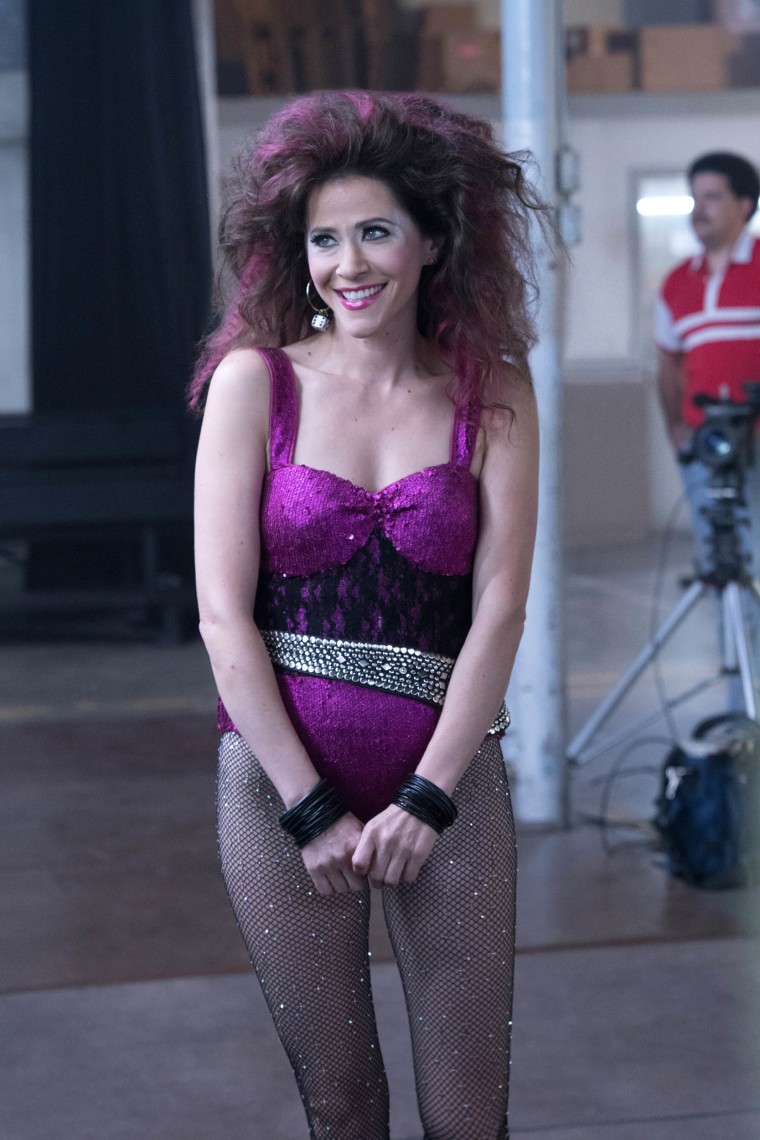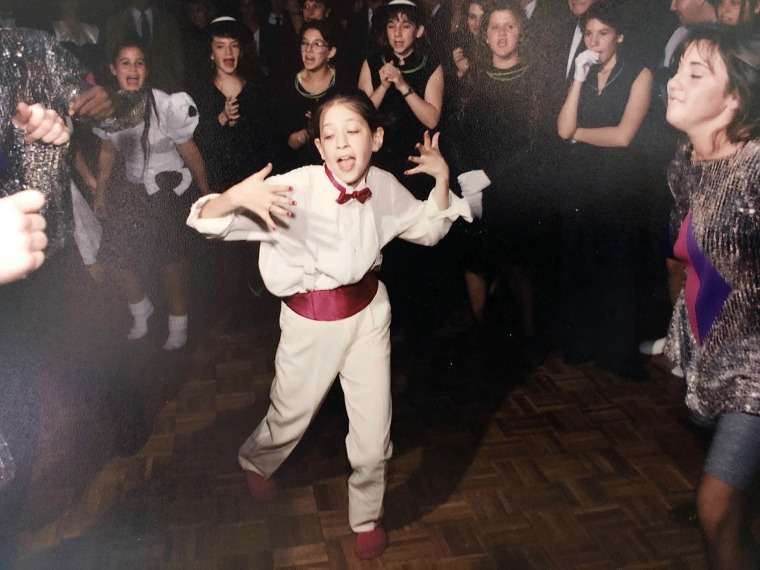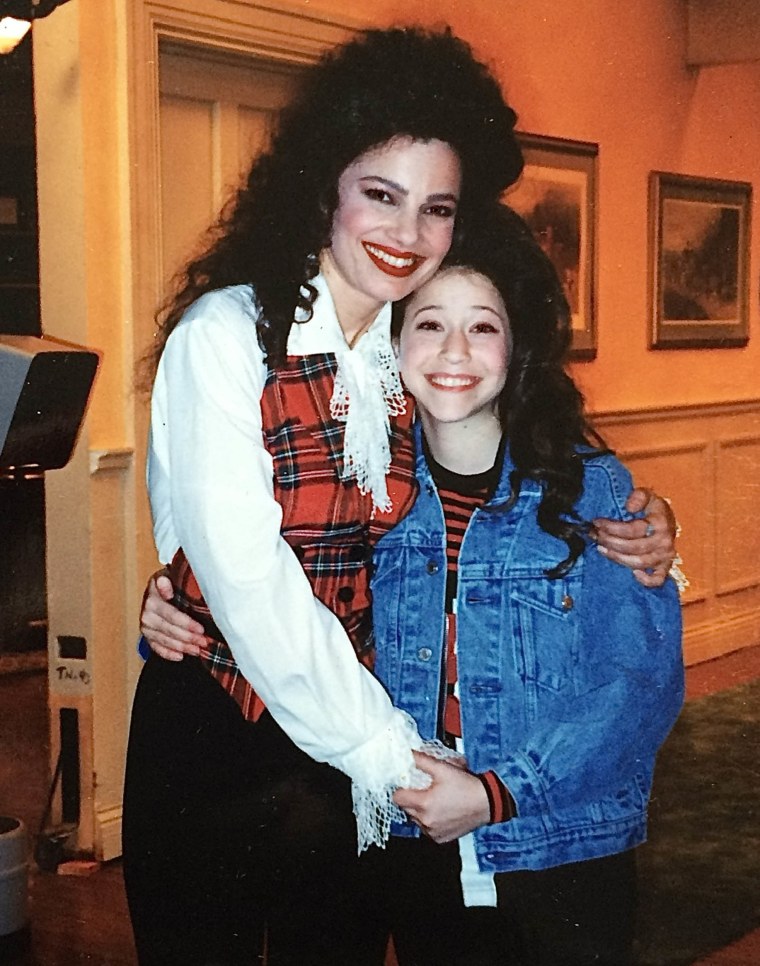Jackie Tohn is admittedly a little sweaty. She’s calling from a cabin on Kristen Bell’s property in L.A. minutes after going on a hike with her close friend and co-star. Their characters are much less friendly in the Netflix rom-com hit “Nobody Wants This” about agnostic podcaster Joanne (played by Bell) and “hot rabbi” Noah (Adam Brody) falling in love.
Tohn’s character, Esther, is aghast since she was sure her brother-in-law would marry her best friend, his recent ex-girlfriend, Rebecca. And, as many characters seem to wonder on the show, how will Joanne fit in with Noah’s Jewish family, friends and life?
Tohn hops on the video call and immediately gets comfortable, tossing her hair up into a ponytail and folding her legs onto the chair as if she’s catching up with an old friend from summer camp, a rite of passage for many Jewish kids. (Her actual former camp, Camp Lokanda, is so proud of their alumna that they boasted about her new show on their Instagram account. She shares that her parents also worked there when she was growing up.)
Like many Nice Jewish Girls from Long Island, Tohn’s parents now live in Boca Raton, Florida, where their daughter’s hit show is the talk of the town.
“My mother, by the way, calls me and is like, ‘I went down to the cafe at our development, and I was a star,’” Tohn recounts in her best Brooklyn accent impression. “‘People were practically waiting in line.’”
While her parents are always proud of her work as an actor and singer, there is something special about this project in particular.
“They are abuzz. They watched it. They love it. They’re ‘plotzing’ and ‘kvelling’ and all the Jewish words, of course, so excited … OK, here’s here’s the level,” Tohn says, suddenly getting serious. “It’s so cool to be part of anything as an actor; it’s really hard to get jobs. So you get a job and it’s like, ‘Oh my God, this is so cool.’ Then to get a job on a thing that people are liking is bonkers. And then to get a job on a show that people are liking, and also it speaks to your roots? It’s, like, there’s a trifecta happening here that’s really not lost on me.”

Tohn has a history of portraying Jewish woman on screen. Her role as Melanie Rosen, aka MelRose, on the gone-too-soon Netflix series “Glow” both embraced and rejected “JAP” (Jewish American Princess) stereotypes while still feeling like a fully formed character. She embodied Jewish comedic legend Gilda Radner in the movie “A Futile and Stupid Gesture” and even played Fran Drescher’s cousin on “The Nanny” as a kid.
“At the risk of sounding like someone I would cringe at when reading an article, it’s an honor,” she says of representing Jewish women and her recent role as Esther.
She already has thoughts about who could play Esther’s mom in future seasons. Lainie Kazan or Bette Midler would be a dream!
But it’s not without controversy. While the internet seems to wholeheartedly agree that Adam Brody’s character is a heartthrob, there’s debate over whether Jewish women are depicted in the same warm light. Critics say the female characters lean into negative tropes and come off as “controlling,”“judgmental” and “shrewish.” And, yes, there’s an overbearing Jewish mother.
Series creator Erin Foster, who was inspired by her real-life relationship with husband Simon Tikhman and eventual conversion to Judaism, told TODAY.com that she has a “great relationship” with her in-laws and that her mother-in-law is “nothing like the character” of Bina (Tovah Feldshuh) in the show.
For her part, Tohn thinks the chatter is much ado about nothing.
“I love being Jewish. I am so proud to be Jewish. I am the flag wavingest Jew around. And it doesn’t bother me that that’s who we are. That’s who I am, that’s who my mother is, that’s who a lot of my, you know … I don’t watch the show thinking it makes us look bad. That’s not my takeaway.”
She thinks a lot of the critics are probably just taking it too seriously anyway.

“If you’re looking at a light comedy and thinking it’s fueling antisemitism, that might be something you need to look at truly, right? Like, we’re making a TV show. We’re going to lean into a couple things you’ve heard before about Jews, and then we’re going to try and disprove some of that. And it’s going to be heightened. It’s for television. … How boring would it be if it was just deadass, straight up your actual life? It’s, like, what are we doing?”
That being said, it was important to Tohn to make sure Esther didn’t feel like a one-note character.
“I wanted to make sure that Esther was multidimensional, and, oftentimes, I was trying to perform the opposite of what was on the page,” Tohn says. “When we first meet her, she’s an absolute lunatic. Her brother-in-law is not only ruining his life, but ruining all of our lives, right? Because it’s, like, with the four of us. So she’s mad because ‘You were with my best friend, and it was always the four of us on vacations, in life, like … you’re ruining this for all of us.’ So she’s very defensive about that.”

She also has sympathy for Bina’s character and her motivations as Noah’s mother. While there’s certainly an “overbearing Jewish mother” stereotype, Tohn says it’s not all that different from other communities.
“So many cultures, most cultures, moms want their kids to be with someone in that culture. And so I think that’s why it is so relatable that, like, yeah, Bina’s character is a little tough, but it’s important to her. Her son is a rabbi. She wants him to be with someone from the culture; that’s not a hard concept to wrap your brain around. That’s most cultures.”
As a descendant of Holocaust survivors (her mother’s parents had three babies in three different countries while on the run), Tohn says there’s a nuance about the pressure Jewish people feel, in particular, about keeping traditions alive.
“I think a big part of Jewish parents wanting their children to be with Jews is to quite literally keep Judaism in existence. I don’t think people understand, because we sort of have a mighty presence. The actual numbers have to be lost on people. There’s 12 of us.
“I mean, we obviously experienced a massive loss, and there aren’t a lot of us now. It’s just a fact,” she continues. “And so I think when you look historically at the bigger (picture) with which Jewish parents want their kids to end up with Jews, it’s more than just, like, ‘I want my kids in the church. I want my kids in the whatever.’ It’s like, you know, we’re out here, the 12 of us that are left, trying to repopulate a people, right? And so … it could get heavy.”
But in Tohn’s own family, it’s not an issue. Her parents don’t mind that her boyfriend isn’t Jewish and neither are her two sisters-in-law.
“You know, my brothers are both married to ‘shiksas,’ right?” Tohn says, using the Yiddish term for non-Jewish women that gets a lot of play on the show. “They call themselves ‘shiksas,’ and it’s never been anything other than a term of endearment and a descriptor.”
Speaking of ‘shiksas,’ Tohn is proud to say she taught Kristen Bell the word and she just thinks it’s cool that a show exists where Bell‘scharacter may convert to Judaism.
Could Tohn convince her friend to do that in real life?